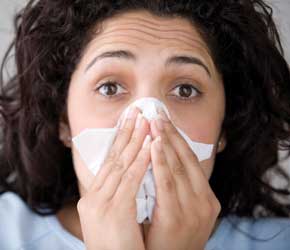Achoo!
Cold and Flu 101

This time of year in the Triangle, it's not unusual for a friend, relative, colleague or even you to have a cough, stuffy nose, aches and pains.
Sounds like a cold.but it could be the flu.
All anyone knows for sure is that she feels miserable. So what's the difference?
The common cold and the flu are caused by separate viruses. They have similar symptoms, so it can be difficult to distinguish between the two.
In general, the effects (such as body aches, fever and fatigue) are more intense with the flu than with the common cold.
Also, colds are more likely to be accompanied by a runny or stuffy nose, and they usually do not result in serious health problems, such as pneumonia, bacterial infections or hospitalizations.
To truly distinguish between a cold and the flu, a doctor can give you a test within the first few days of your feeling sick.
Here's an outline on both illnesses:
It's cold out there
A cold is an infection of your upper respiratory tract, which can be caused by one of more than 200 viruses.
Most adults are likely to have a cold two to four times a year, especially during the fall and winter when people typically spend more time inside.
As you go from childhood to adulthood, you develop immunity to many of these viruses. But you are at increased risk when you spend most of your time indoors, are in close contact with other people, have allergies or have psychological stress.
Mythical causes of colds, such as going out with wet hair or catching a chill, have never been proven in clinical studies.
How do you know if you have a cold? According to the Mayo Clinic, symptoms include:
• Runny or stuffy nose
• Itchy or sore throat
• Cough
• Congestion
• Slight body aches or a mild headache
• Sneezing
• Watery eyes
• Low fever
• Mild fatigue
A cold generally goes away in about a week. Seek medical attention if your symptoms last longer or if you have:
• Fever greater than 102 degrees
• Aches and fatigue
• Sweats, chills and a cough with colored phlegm
• Symptoms that get worse instead of better
There is no cure for the common cold, and antibiotics are useless against it. Over-the-counter medications can help relieve some symptoms.
To reduce fever, sore throat and headaches, take acetaminophen or other mild pain relievers. To combat runny nose and congestion, try an antihistamine or decongestant.
You can make yourself as comfortable as possible until the illness works itself out of your system by:
• Drinking lots of fluids.
Avoid alcohol, caffeine and cigarette smoke, which can cause dehydration and aggravate symptoms.
• Getting plenty of rest.
Stay home from work if you have a fever or a bad cough or are drowsy from medications.
• Adjusting the room's temperature and humidity.
Keep it warm but not overheated. If the air is dry, a cool-mist humidifier or vaporizer can moisten the air to help ease congestion and coughing.
• Soothing your throat.
Gargling with warm salt water several times a day or drinking warm lemon water with honey may help relieve a sore throat and quiet a cough.
• Using nasal drops.
Try saline drops, which can be purchased over the counter, to break up congestion.

Truly the flu?
The flu is a contagious respiratory illness caused specifically by influenza viruses. Every year in the United States, 5 percent to 20 percent of the population gets it.
Like the common cold, flu is spread in respiratory droplets caused by coughing and sneezing. Most adults may be able to infect others beginning a day before symptoms develop and up to 5 days after becoming sick.
The symptoms are similar to, but slightly more intense than, those of the common cold. According to the Centers for Disease Control, some signs are:
• Fever, usually high, over 102 degrees
• Headache
• Dry cough
• Sore throat
• Extreme tiredness
• Runny or stuffy nose
• Muscle aches
• Stomach symptoms, such as nausea, vomiting and diarrhea
The single best way to prevent the flu is to get vaccinated. There are two types of vaccines:
• The shot contains an inactivated vaccine and is approved for those older than 6 months, including healthy people and those with chronic medical conditions.
• The nasal-spray version is made with live, weakened flu viruses that do not cause the flu and is approved for use in healthy people ages 5 to 49 who are not pregnant.
There are some people who should not get the flu vaccine. Don't get it if you:
• Are allergic to chicken eggs
• Have had a severe reaction to an influenza vaccination in the past
• Developed Guillain-Barre syndrome within six weeks of getting the vaccine before
• Have a moderate or severe illness with a fever
Simple Safegaurds
You don't have to spend the fall or winter sick. Reduce your chances of getting a cold or the flu with the following prevention tips from the Mayo Clinic:
• Wash your hands often.
• Use soap and warm water and rub hands vigorously, scrubbing all surfaces 15 to 20 seconds. It is the soap combined with the friction that kills germs. Especially wash up before, during and after food preparation, before eating, after using the bathroom, after handling animals and when someone around you is sick. Also, keep alcohol-based hand sanitizers in your purse and car for times when a sink might not be available.
• Scrub your stuff.
• Use a solution of bleach or other products that can destroy bacteria to disinfect areas that may have high concentrations of germs. Keep kitchens and bathroom countertops clean, especially when someone in your home is sick. Given the right conditions, some germs can live on surfaces hours or even days.
• Avoid touching your eyes, mouth and nose.
• Cover your mouth and nose with a tissue when sneezing and coughing.
• Throw away used tissues immediately.
• Don't share drinking glasses or utensils with family members.
• When someone in your house is sick, use disposable cups.
• Avoid contact with those who have colds.
• If you're already sick, stay home to rest and to ensure you don't pass on the illness to others.
• Exercise regularly, get adequate rest and eat a healthy, balanced diet.
• Visit a doctor if you start to feel sick.
• Early treatment can help you get better sooner.


